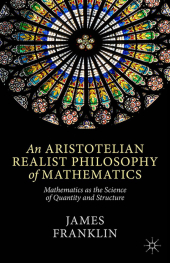 Neuerscheinungen 2014Stand: 2020-02-01 |
Schnellsuche
ISBN/Stichwort/Autor
|
Herderstraße 10
10625 Berlin
Tel.: 030 315 714 16
Fax 030 315 714 14
info@buchspektrum.de |

J. Franklin
An Aristotelian Realist Philosophy of Mathematics
Mathematics as the Science of Quantity and Structure
1st ed. 2014. 2014. x, 308 S. 216 mm
Verlag/Jahr: SPRINGER PALGRAVE MACMILLAN; PALGRAVE MACMILLAN UK 2014
ISBN: 1-349-48618-3 (1349486183)
Neue ISBN: 978-1-349-48618-2 (9781349486182)
Preis und Lieferzeit: Bitte klicken
Mathematics is as much a science of the real world as biology is. It is the science of the world´s quantitative aspects (such as ratio) and structural or patterned aspects (such as symmetry). The book develops a complete philosophy of mathematics that contrasts with the usual Platonist and nominalist options.
Preface PART I: THE SCIENCE OF QUANTITY AND STRUCTURE 1. The Aristotelian Realist Point of View 2. Uninstantiated Universals and ´Semi-Platonist´ Aristotelianism 3. Elementary Mathematics: Quantity and Number 4. Higher Mathematics: Science of the Purely Structural 5. Necessary Truths about Reality 6. The Formal Sciences Discover the Philosophers´ Stone 7. Comparisons and Objections 8. Infinity 9. Geometry: Mathematics or Empirical Science? PART II: KNOWING MATHEMATICAL REALITY 10. Knowing Mathematics: Pattern Recognition and Perception of Quantity and Structure 11. Knowing Mathematics: Visualization 12. Knowing Mathematics: Understanding and Proof 13. Explanation in Mathematics 14. Idealization: An Aristotelian View 15. Non-Deductive Logic in Mathematics Epilogue: Mathematics, Last Bastion of Reason Notes Select Bibliography Index
"An Aristotelian Realist Philosophy of Mathematics is an interesting and challenging book. ... Franklin goes through a wealth of material in philosophy, mathematics, and science to motivate and justify his position. ... there will still be something for all readers to enjoy due to its large scope and variety of interesting and detailed examples." (Alex Koo, The Mathematical Intelligencer, Vol. 38, September, 2016)
"The book is comprised of fifteen chapters plus a brief epilogue. ... An Aristotelian Realist Philosophy of Mathematics contains many interesting and important discussions, in particular, the discussion of the use of inductive reasoning in mathematics ... . This book is provocative and interesting reading for anyone interested in how mathematical entities are related to the physical world and how we gain knowledge of such entities." (James Davies, Metascience, Vol. 24, 2015)
"A short review cannot do justice to the variety of problems considered and the interesting angles of attack offered by [Franklin´s] realist point of view."
-David Guaspari, The New Criterion
"Most of the traditional problems in the philosophy of mathematics arise, in James Franklin´s words, out of the ´oscillation between Platonism and nominalism, as if those were the only alternatives´ (p. 11). In An Aristotelian Realist Philosophy of Mathematics Franklin develops a tantalizing alternative to these approaches by arguing that at least some mathematical universals exist in the physical realm and are knowable through ordinary methods of access to physical reality. By offering a third option that lies between these extreme all-or-nothing approaches and by rejecting the ´dichotomy of objects into abstract and concrete´, Franklin provides potential solutions to many of these traditional problems and opens up a whole new terrain for debate in the philosophy of mathematics (p. 15). The acknowledgement of this by no means new but oft neglected Aristotelian position sheds refreshing new light on debates that have become somewhat stagnant in recent times. Furthermore, by drawing attention to the possibility of an Aristotelian alternative, Franklin opens the way for a whole host of new debates to emerge regarding the correct Aristotelian approach. The scope of the book is ambitious and the overall position defended is controversial in a number of ways. As such, it gives rise to as many new questions as it provides answers. However, this should be seen as a positive, since the many questions that arise are deeply significant and have been neglected by philosophers of mathematics for far too long."
-Max Jones, Philosophica Mathematica
"This book should be part of the personal library of any university-level student of philosophy."
-Jude P. Dougherty, Review of Metaphysics


